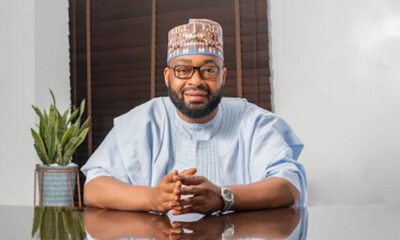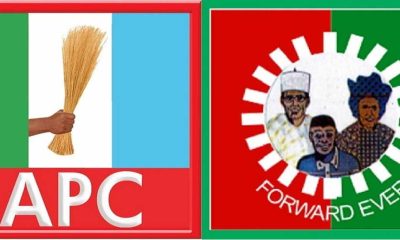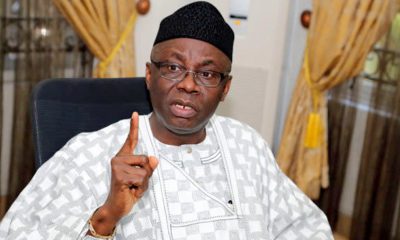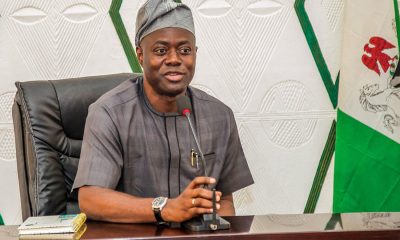Business
Nigeria lagging behind in $2t Islamic Finance Market — Minister

The Minister of Finance, Budget and National Planning, Zainab Ahmed, says the penetration of Islamic financing in Nigeria is low and remains insignificant in the over $2 trillion global market, despite potentials to drive a more competitive economy.
To this end, the Minister said Nigeria needs significant financial sector reforms that will bolster the growth and penetration of Islamic finance and deliver overall economic growth.
Ahmed disclosed this at the 5th African International Conference on Islamic Finance, themed: “Infrastructure financing, sustainability and the future of African market 2.0,” in Abuja on Tuesday.
She stressed that Islamic finance instruments like Sukuk have been very instrumental in bridging Nigeria’s infrastructure gap by promoting investments in key economic sectors like healthcare, education and transportation.
She said: “The asset-backed nature and risk-sharing components of Islamic finance structures help improve financial sector stability and make them appropriate for infrastructure public private partnerships.”
Ahmed further disclosed that one of the impediments to the development of Islamic finance is the notion that Islamic finance is just for Muslims.
To combat this, she said Nigeria must establish comprehensive operational frameworks for Islamic financial products and services and improve awareness of the financing options to the real sector.
“Consequently, stakeholder engagement becomes imperative to enhance the soundness and efficiency in our financial system on Islamic finance, if we are to build a globally competitive economy,” Ahmed said.
Muhammad Sanusi II, 14th Emir of Kano, in his keynote speech stressed that the greatest advantage of Islamic finance is its connection to the real economy.
According to him, it is a more sustainable and accountable way to finance critical infrastructure for development.
Sanusi said: “When the government issues bonds in the capital markets investors are just looking forward to getting their interests and capital and it is easy to track the money and where it goes to.
“But with Sukuk it is possible to know exactly what the money will be used for.
“Overall, Islamic finance provides a potent alternative for resource mobilisation and fair and equitable allocation of resources that could help address the sustainable development goals.
“However, an essential condition for the development of Islamic finance markets is the presence of an effective legal and regulatory framework to provide an enabling environment that will create a level playing field, and enforce the legality of Islamic finance contracts and ensure Sharī’ah compliance.”
The former Governor of Central Bank of Nigeria debunked claims that Islamic financing is aimed at islamising Nigeria.
He stressed that the purpose was to deepen financial inclusion and drive development.
Ummahani Amin, Chairman of the Conference Planning Committee, said the conference represents a strong and enduring commitment by Islamic finance industry stakeholders to discuss strategies and financial reforms geared towards the development of the industry.
The CEO of Metropolitan Skills and Law Firm explained that the conference represents advocacy for infrastructural development amid an ailing global economy and humanitarian crisis.
This, Amin noted, was the basis of the reprise of the last edition’s theme for this year’s edition.
The Eagle
Aviation
Air Peace suspends flights nationwide over NiMet strike

Air Peace suspends flights nationwide over NiMet strike
Air Peace has suspended all its flight operations across the country due to the ongoing strike by the Nigerian Meteorological Agency (NiMet).
The airline said in a statement on Wednesday that it was also suspending operations due to the unavailability of QNH (hazardous weather) reports required for safe landings.
“Due to the ongoing NiMet strike and the unavailability of QNH (hazardous weather) reports required for safe landings, Air Peace has suspended all flight operations nationwide until the strike is over,” Air Peace said.
“Your safety is our top priority. We appreciate your understanding and will share updates as the situation unfolds.”
The airline had earlier announced that the NiMet strike could lead to flight delays and cancellations across its network.
Air Peace added that it was monitoring the situation and working with relevant stakeholders to minimise the impact on customers’ travel plans.
Employees of NiMet commenced a nationwide indefinite strike over welfare issues on Wednesday.
Some of the issues raised involve “NiMet’s refusal to negotiate or implement agreed financial allowances and unresolved entitlements,” including wage awards, peculiar allowances, and outstanding payments from the 2019 minimum wage.
They also accused the management of the agency of withholding important documents, ignoring requests for inclusion of omitted staff in past payments, and neglecting key training programmes in favour of executive retreats.
Business
Nigeria’s gas production increases by 15.6% to 227,931.65 mscf

Nigeria’s gas production increases by 15.6% to 227,931.65 mscf
Nigeria’s gas output has increased 15,6 percent month-on-month, MoM, to 227,931.65 million standard cubic feet, mscf, in March 2025.
But on year-on-year, YoY basis, the nation’s gas output recorded a marginal increase to 227,931.65 mscf in March 2025, from 198,353.62 mscf, recorded in the corresponding period of 2024.
Data obtained from the Nigerian Upstream Petroleum Regulatory Commission, NUPRC, Gas Production Status reports indicated that of the total of 227,931.65 mscf produced in March 2025, 119,552.75 mscf was associated while 108,378.90 mscf was non-associated gas.
Associated gas is extracted in the process of producing crude oil while non-associated gas is produced without crude oil after much investment, exploration and development.
The Ministry of Petroleum Resources (Gas), which is directly involved in the development of policies, targeted at increasing investment in the sector said efforts have been made to increase investment and production of gas in Nigeria.
Similarly, in its recent report obtained by Vanguard, the Nigerian LNG Limited stated: “We are fully committed to expanding our operations with the NLNG Train 7 Project, which will boost our production capacity by 35%, increasing from 22 Million Tonnes Per Annum (mtpa) to 30 mtpa. This project underscores our role as a key player in the global LNG market and positions Nigeria as a top-tier supplier of LNG, leveraging its vast proven gas reserves of 202 trillion cubic feet (the 9th largest globally).
Vanguard
Business
Marketers count losses as NNPC slashes petrol price

Marketers count losses as NNPC slashes petrol price
Petroleum product marketers have expressed frustration over financial losses following the Nigerian National Petroleum Company Limited’s (NNPC) recent reduction in the pump price of Premium Motor Spirit (petrol).
On Easter Monday, NNPC retail outlets across major cities adjusted their pump prices, with Lagos stations dropping from N925 to N880 per litre, while Abuja saw a similar drop to N880. In Kano, the price was revised from N950 to N935 per litre.
The unexpected price cut comes just days after the Dangote Refinery reduced its ex-depot price from N865 to N835 per litre—further intensifying pricing pressure on independent marketers who had stocked up at previous, higher rates.
The $20bn refinery also directed its partners like MRS, Heyden, and Ardova to sell a litre of petrol at the rate of N890 instead of N920 in Lagos, N900 in the South West, N910 in the South-South, and N920 in the North East.
READ ALSO:
- Insecurity: Presidency questions push for state police, accuses govs of not doing much
- Wike’s team warns Falana against ‘misleading his clients’
- Rivers: Fubara’s supporters praise Tinubu’s intervention with emergency rule
This newspaper observes that the new NNPC prices in Kano, Abuja, Port Harcourt and Lagos are N10-N15 lower than that of the Dangote refinery, signalling another price war between the two companies.
Our correspondent reports that some NNPC filling stations are still selling at the old rate. But marketers said these stations were given the liberty to exhaust old stock before adjusting to the new prices.
In an interview with our correspondent, the National Vice President of the Independent Marketers Association of Nigeria, Hammed Fashola, confirmed the price reduction, stressing that filling station operators were losing money.
He told our correspondent that NNPC Retail sent a memo to its outlets to effect the new prices.
“It is confirmed that NNPC has reduced PMS prices. It is now N880 per litre in Lagos. They sent messages to their retail outlets. Some of them have already put the price at N880. However, they allow those having old stock to continue selling at the old rate. Some are still selling at N910.
“Those are the ones that still have their old stock. So, the same thing applies to independent marketers. Those that have their old stock are still trying to see how they can dispense it,” he stated.
While acknowledging that the fluctuation in fuel prices is one part of deregulation, Fashola declared that marketers are losing money.
“The price reduction is a welcome development, but at the same time, it has a negative impact on the side of the marketers. We are losing money. That’s just the truth. We are losing money. That’s the bitter truth,” he said.
READ ALSO:
- UK records over 22,000 asylum-seeking Nigerians
- Driver crushes one-year old boy to death in Ekiti
- Bring your children to compete with mine, MC Oluomo challenges those mocking his spoken English
According to him, the price cuts are good for the masses, but marketers pay the price.
“On the side of the masses, Nigerians are better for it. People are getting cheaper fuel now, which is good. That’s the beauty of deregulation that we are talking about. There’s nothing anybody can do about it. But marketers are the ones bearing the losses, seriously.
Asked if there is any way to reduce the losses, he replied, “On the part of marketers, what we can do is just to try as much as possible to try and sell. We will reduce prices to a level that, at least, our losses will not be too much. So, you will be able to get rid of your old stock before you go to the market to buy at the new rate and start selling at the new rate.
On whether the petrol price could drop to N800 or N700 soon, Fashola refused to make projections.
“I don’t want to predict that. You know, two major factors determine this – the crude oil price and our exchange rate. So, I don’t want to predict the price. All these things have their implications. If the crude oil comes down to something like $50 per barrel, it has its own implications for our economy. It will affect the government revenue. At the same time, inflation and all that are also there. So, I don’t want to predict that,” he stated.
Recall that the Dangote refinery resumed price cuts after the Federal Government directed that the naira-for-crude deal should continue indefinitely.
Marketers count losses as NNPC slashes petrol price
(Punch)
-

 metro3 days ago
metro3 days agoRivers: Tinubu meets with Fubara, may lift his suspension
-

 metro2 days ago
metro2 days agoI’m not in supremacy battle with Ooni, says new Alaafin
-

 Entertainment1 day ago
Entertainment1 day agoP-Square: Jude Okoye freed after two months detention
-

 metro6 hours ago
metro6 hours agoOmokri : How Tinubu’s political mastery started with Abiola, says El-Rufai, Obi’s forces can’t stop him
-

 metro3 days ago
metro3 days agoBandits attack Kwara North, kill vigilante, six others
-

 Business2 days ago
Business2 days agoNigeria’s gas production increases by 15.6% to 227,931.65 mscf
-

 metro1 day ago
metro1 day agoNiger Gov Bago makes U-turn on dreadlocks ban after backlash
-

 Politics1 day ago
Politics1 day agoLabour Party collapses into APC in Plateau













